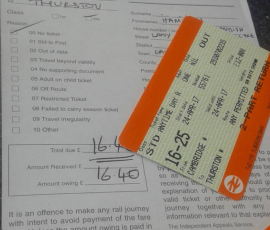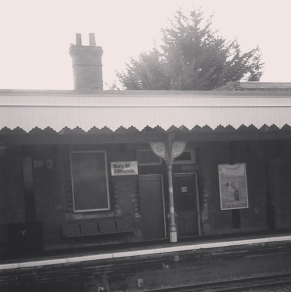Your Research. Your Life. Your Story.
A magnetic community of researchers bound by their stories
Every researcher has a story. What’s yours?
My fieldwork gave me 5 important lessons!

Okay, before I write about fieldwork, let me say that this post was partly inspired by this writer’s block of mine for my first results chapter; it has been there since I first started writing the first results chapter (I’ve since finished my second results chapter), and despite my best effort to contain it by using the time to reflect on the presentation of my first results chapter and how data sources are used to answer my first research sub-question (which has been useful, I might add; my thinking was clearer), I am still bugged by it.
So, to rekindle my own passion for my work, let me reflect back on what happened during fieldwork, and what I have learned from it. This post was generously edited by FERSA Cambridge, who suggested that it is best suited for my personal blog.
It was first titled “messiness of fieldwork,” but as FERSA thinks that it “reads more like a stream of consciousness,” I have decided to rename it “thoughts on fieldwork.”

I bumped into a friend at College just now, she had just returned from fieldwork and I quipped (and she agreed) that fieldwork was the best of time and it was also the worst of time, unintentionally quoting Charles Dickens from A Tale of Two Cities.
So, what happened during fieldwork and what have I learned from it?
a) Participants and researchers are human beings, and human beings can be forgetful

I once sat at a school reception for nearly an hour, waiting for a teacher because s/he had forgotten that I was going to observe his/her class that day. On the other hand, there was a time that I waited for an hour because I was the one who forgot to let the participant know that I was going to come in!
Then, there was the time when I forgot my railcard and bank card in an attempt to catch the train on time, which led to me now remembering to check whether I’ve got both with me before I catch a train.
b) Logistics can be challenging
Though I chose participants whose school was accessible by public transport, the fact that they were scattered all across East Anglia and the Home Counties meant having to deal with train/bus rides (including delays!). This meant having to plan my day and time carefully so that I came to school on time.
c) Some data sources can turn out to be irrelevant to the study
I collected and transcribed a lot of data between September and December, only to realize in January that some of my data sources did not help with answering the research questions. Fortunately, I discovered this early on.
d) Ethical issues can arise
Some of my participants asked me for feedback on lessons that I observed. I was hesitant to do so at first as my feedback might influence the outcome of the study, which then raised the issue of ethics. I discussed this with my supervisor and we agreed that I should provide feedback if they asked for it, as it was within my professional capacity as a teacher. Not only that, providing feedback when they ask for it will help me form a trusting relationship with my participants.
e) Your personal circumstances can influence fieldwork
Fieldwork can be demanding. I had times during my fieldwork where I felt overworked, nervous, and questioned what I was doing. I coped with this by talking to my supervisor, doing one thing at a time, and, most importantly, taking care of my own well-being.
Having said that, fieldwork was the best of times, because:
- I got to experience new areas, new schools, and new people.
![Default Title Text Default Alt text]()
Some of the schools that I went to were located in places that I might not have gone to if not for fieldwork, as the schools were located in market towns like Bury St. Edmunds and King’s Lynn or villages like Thurston and Soham.
During school visits, I was fortunate to chat with many lovely teachers who had more teaching experience than me, and it was nice to experience that a school environment remains the same wherever you are. - I got to know six inspiring individuals who let me write about their journey as a teacher.
The best thing about fieldwork was, without a doubt, getting to know my research participants who were willing to let me enter their lives for a short while. As a researcher, it was a great privilege for me to document their PGCE journey and exchange ideas and stories with them.
Overall, fieldwork really was the best of times and the worst of times.
It was the worst of times because I got really exhausted as I was travelling almost every day. One of my participants once said to me “I don’t know how you do it,” when I mentioned that I was going catch the 6 am train to visit one of her colleagues the next day.
Then, it was also the best of times because, at the end of the day, the purpose of fieldwork is to gather data sources to answer my research questions, which will then be used to produce a body of work that adds to human knowledge, making a little dent to that circle.
My advice to PhD colleagues who’re about to go for fieldwork soon:
- Fieldwork is exhausting; so, take care of your health, and I mean both physical and mental health.
- When in doubt, talk to your supervisor(s). They’ve been on loads of fieldwork trips before, so they know what you are talking about and, thus, will be able to provide advice.
- Record your fieldwork journey, be it through a diary or a research blog. I find that the research blog is useful to sort out my thinking, plus it also serves as field notes.
- Lastly, enjoy the experience, see it as a time for you to learn and to meet people, and go to places that you would otherwise not go to.
Hamizah Haji-Haidi (@AmyHeidi) is a PhD candidate at the University of Cambridge. This story was published on September 25, 2017, on Hamizah’s blog, Reflective journeys of a doctoral student (available here), and has been republished here with her permission.
Comments
You're looking to give wings to your academic career and publication journey. We like that!
Why don't we give you complete access! Create a free account and get unlimited access to all resources & a vibrant researcher community.

Your Research. Your Life. Your Story.
A magnetic community of researchers bound by their stories







